

RELATIVE CLAUSES Ppt Presentation. Relative clauses : Relative clauses We use a relative pronoun in order to connect two sentences which have the same pronoun.
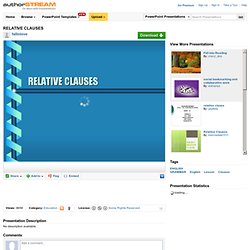
Ali goes to school. The school is far away. Ali goes to school which is far away. Relative pronoun Examples : Examples That is the man. Examples Do you know the girl. Where or which? Where or which? Use of “that” : Use of “that” Instead of using “who” and “which” we can use “that”. ( only for who and which and in defining relative clauses) I live in Afyon. OMISSION of the relative pronoun : OMISSION of the relative pronoun We can omit the relative pronoun if it is followed by a pronoun or noun.
Copy of relative clauses by Alba Guimerà on Prezi. Definitely, Maybe: Restrictive Relative Clauses. This is the opening titles scene of this really nice romantic comedy.
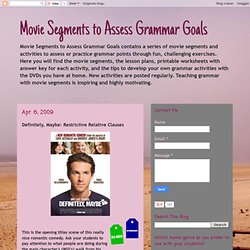
Ask your students to pay attention to what people are doing during the main character's (Will's) walk from his office to his daughter's school. Because there are several characters performing different activities, it is great for the students to practice the use of relative (restrictive) clauses. Definitely Maybe: 3’28 I. Match the two activities the same character(s) is (are) performing. U8_Exercise 1 - some, any, much, many, a lot of, a little, a few. A Little / A Few. Exercises on A Little and A Few The expressions a little and a few mean some.
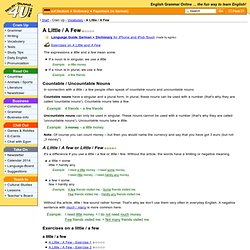
If a noun is in singular, we use a little Example: a little money If a noun is in plural, we use a few Example: a few friends Countable / Uncountable Nouns In connection with a little / a few people often speak of countable nouns and uncountable nouns. Countable nouns have a singular and a plural form. Example: 4 friends – a few friends Uncountable nouns can only be used in singular. 3 money – a little money Note: Of course you can count money – but then you would name the currency and say that you have got 3 euro (but not „3 money“).
U7_A, an, no article_BBC LEARNING ENGLISH. ARTÍCULOS EN INGLÉS - A, An, The, o Ninguno? 4: inglés para principiantes. Questions and prepositions. Questions / British Council. Questions. U1_When / While: indicating time-relative activities. In traditional grammar, the adverbs when and while introduce adverbial clauses.
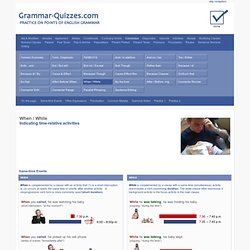
They are called also called subordinating conjunctions which, in this case, join time-related clauses. The clause is called a dependent clause. Note that in traditional grammar, a preposition requires an object, a noun or noun phrase, after it. All other types of complements such as an adverb phrase, infinitive phrase, gerund phrase, or clause are not included in the definition of a prepositional phrase. The word is often called a conjunction or subordinating conjunction. U2_Adjectives and Adverbs. U4_English exercises: Tag Questions. U4_PRESENT PERFECT WITH ALREADY AND YET.
Present perfect. I still haven't found what I'm looking for.
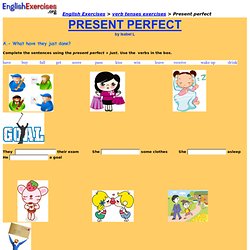
U2 I have the highest mountains I have through the fields Only to be with you Only to be with you I have I have I have these city walls Only to be with you But I still haven't found What I'm looking for But I still haven't found What I'm looking for a. I have spoke with the tongue of angels b. But I still haven't found What I'm looking for But I still haven't found What I'm looking for I /bɪˈli:v/ in the Kingdom Come Then all the colors will /bli:d/ into one But yes I'm still running.
Present perfect with already, yet, just. Yet-Already-Just. Present Perfect - Just - Already - Yet. Exercício Present Perfect: just, already, since, for or yet. Mary escreveu:Challenge: Try your hand at this exercise on the Present PerfectPresent perfect is formed with ‘have’, an auxiliary, and the past participle of the main verb.
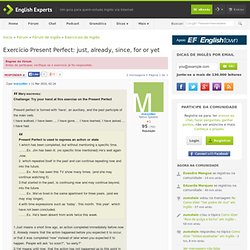
I have walked, I have been…, I have gone…, I have learned, I have asked…, I have had. Present Perfect is used to express an action or state 1.which has been completed, but without mentioning a specific time.........Ex. Jim has been ill. (no specific time mentioned) He’s well again ,now. 2. which repeated itself in the past and can continue repeating now and into the future.........Ex. Ann has seen this TV show many times. 1.Just means a short time ago, an action completed immediately before now.2. EXERCISEFill in the blanks with just, already, since, for, or yet. I’ve ____ finished putting the baby down for a nap and she is ____ asleep.
ANSWER KEYI’ve just finished putting the baby down for a nap and she is already asleep. U6_For and Since. FOR or SINCE - which is correct?